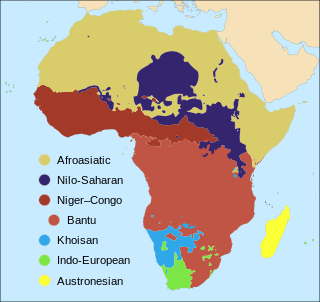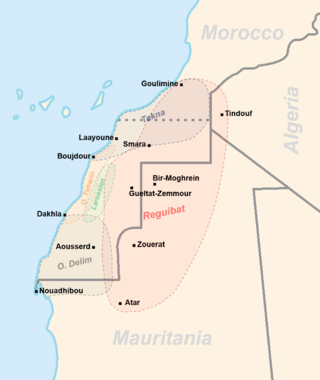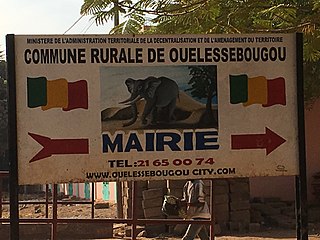Related Research Articles

Demographics of Libya is the demography of Libya, specifically covering population density, ethnicity, education level, health of the populace, economic status, and religious affiliations, as well as other aspects of the Libyan population. The Libyan population resides in the country of Libya, a territory located on the Mediterranean coast of North Africa, to the west of and adjacent to Egypt. Libyans live in Tripoli. It is the capital of the country and first in terms of urban population, as well as Benghazi, Libya's second largest city.

Demographic features of the population of Mali include population density, ethnicity, education level, health of the populace, economic status, religious affiliations and other aspects of the population.

Berbers or the Berber peoples, also called by their contemporary self-name Amazigh or Imazighen, are a diverse grouping of distinct ethnic groups indigenous to North Africa who predate the arrival of Arabs in the Arab migrations to the Maghreb. Their main connections are identified by their usage of Berber languages, most of them mutually unintelligible, which are part of the Afroasiatic language family. They are indigenous to the Maghreb region of North Africa, where they live in scattered communities across parts of Morocco, Algeria, Libya, and to a lesser extent Tunisia, Mauritania, northern Mali and northern Niger. Smaller Berber communities are also found in Burkina Faso and Egypt's Siwa Oasis.

The number of languages natively spoken in Africa is variously estimated at between 1,250 and 2,100, and by some counts at over 3,000. Nigeria alone has over 500 languages, one of the greatest concentrations of linguistic diversity in the world. The languages of Africa belong to many distinct language families, among which the largest are:

The Tuareg people are a large Berber ethnic group that principally inhabit the Sahara in a vast area stretching from far southwestern Libya to southern Algeria, Niger, Mali, and Burkina Faso. Traditionally nomadic pastoralists, small groups of Tuareg are also found in northern Nigeria.

The Tuareg languages constitute a group of closely related Berber languages and dialects. They are spoken by the Tuareg Berbers in large parts of Mali, Niger, Algeria, Libya and Burkina Faso, with a few speakers, the Kinnin, in Chad.

The Maghreb, also known as the Arab Maghreb and Northwest Africa, is the western part of the Arab world. The region comprises western and central North Africa, including Algeria, Libya, Mauritania, Morocco, and Tunisia. The Maghreb also includes the disputed territory of Western Sahara and the Spanish cities Ceuta and Melilla. As of 2018, the region had a population of over 100 million people.

The Sahrawis, or Sahrawi people, are an ethnic group and nation native to the western part of the Sahara desert, which includes the Western Sahara, southern Morocco, much of Mauritania, and along the southwestern border of Algeria. They are of mixed Hassani Arab and Sanhaji Berber descent, as well as Sub-Saharan African and other indigenous populations.

Mali is a multilingual country of about 21.9 million people. The languages spoken there reflect ancient settlement patterns, migrations, and its long history. Ethnologue counts more than 80 languages. Of these, Bambara, Bobo, Bozo, Dogon, Fula, Hassaniya, Kassonke, Maninke, Minyanka, Senufo, Songhay languages, Soninke and Tamasheq are official languages. French is the working language.

Berberism is a Berber political-cultural movement of ethnic nationalism, started mainly in Kabylia (Algeria) and in Morocco later spreading to the rest of the Berber communities in the Maghreb region of North Africa. The Berberist movement in Algeria and Morocco is in opposition to cultural Arabization, the pan-Arabist political ideology and Islamism.

The sole official language of Gibraltar, a British overseas territory, is English, which is used by the Government and in schools. The eponymous Gibraltarian English accent is spoken in the territory.

The Arab world consists of 22 states. As of 2021, the combined population of all the Arab states was around 475 million people.

The following outline is provided as an overview of and topical guide to Mauritania:

Mauritania, officially the Islamic Republic of Mauritania, is a sovereign country in Northwest Africa. It is bordered by the Atlantic Ocean to the west, Western Sahara to the north and northwest, Algeria to the northeast, Mali to the east and southeast, and Senegal to the southwest. By land area, Mauritania is the 11th-largest country in Africa and the 28th-largest in the world, and 90% of its territory is situated in the Sahara. Most of its population of 4.4 million lives in the temperate south of the country, with roughly one-third concentrated in the capital and largest city, Nouakchott, located on the Atlantic coast.

Ethnic groups in Algeria include Arabs and Berbers, who represent 99% of the population, of which 75–85% are Arab and about 15–25% are Berber. Algeria also has a minority population of Europeans that represents less than 1% of the population. The minority European population is predominantly of French, Spanish, and Italian descent.

Arab-Berbersare a population of the Maghreb, a vast region of North Africa in the western part of the Arab world along the Mediterranean Sea and the Atlantic Ocean. Arab-Berbers are people of mixed Arab and Berber origin, most of whom speak a variant of Maghrebi Arabic as their native language, some also speak various Berber languages. Many Arab-Berbers identify primarily as Arab and secondarily as Berber.

The people of Mauritania are overwhelmingly adherents of Sunni Islam, of the Maliki school of jurisprudence.
The history of the Jews in Mali dates back to the 8th century CE. Today, around 1,000 descendants of Jews live in Mali, mostly in or near Timbuktu.